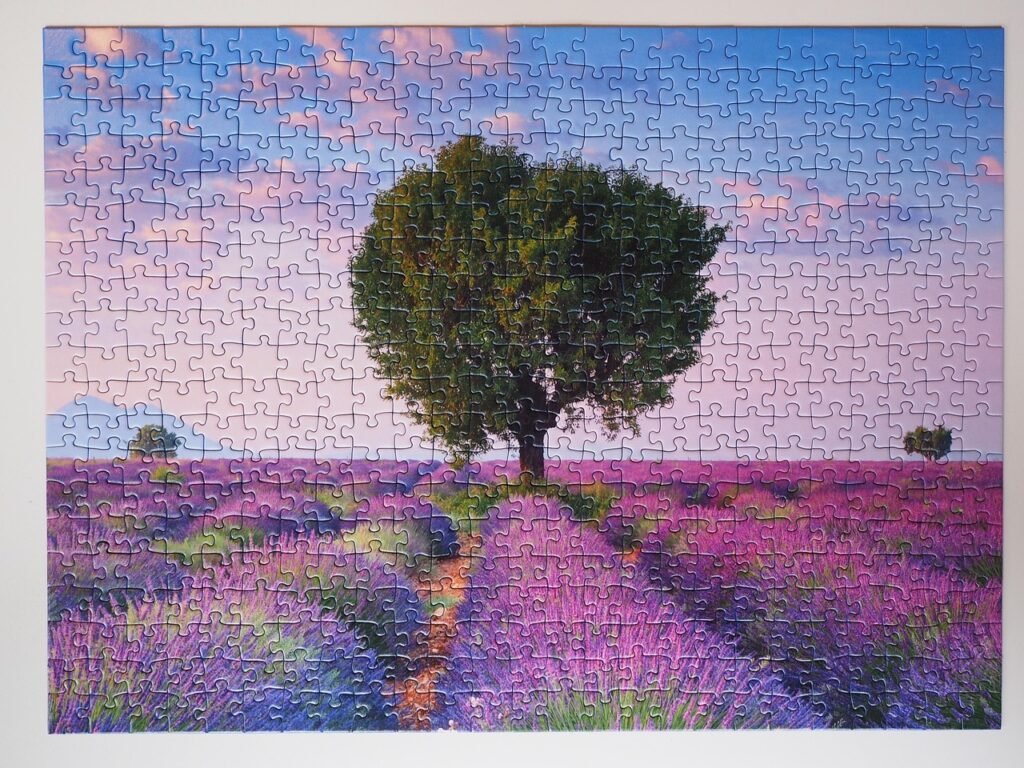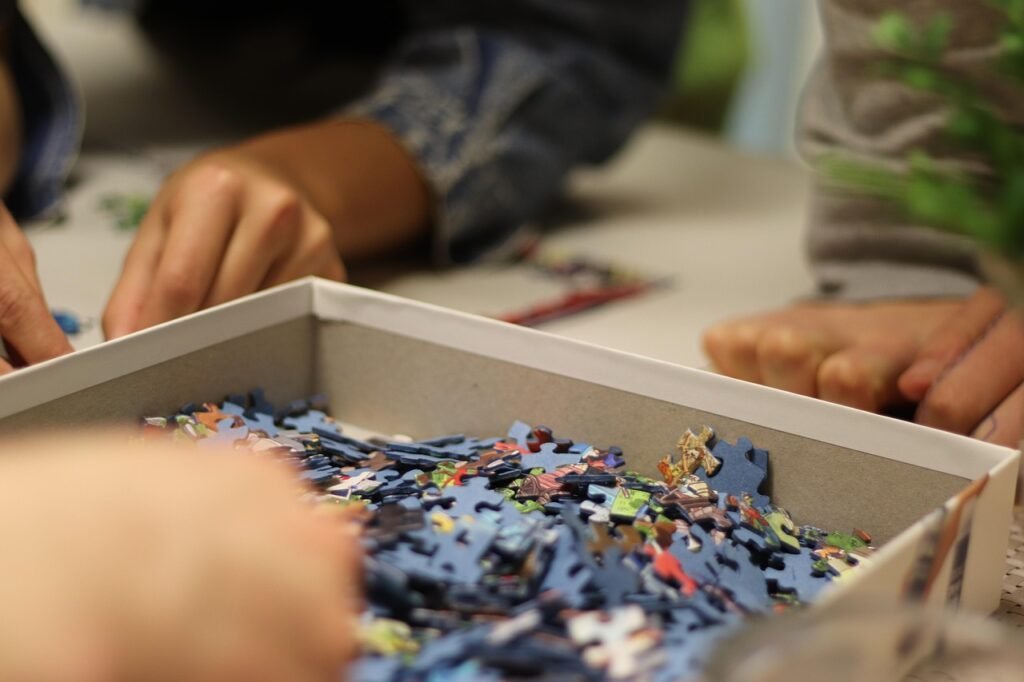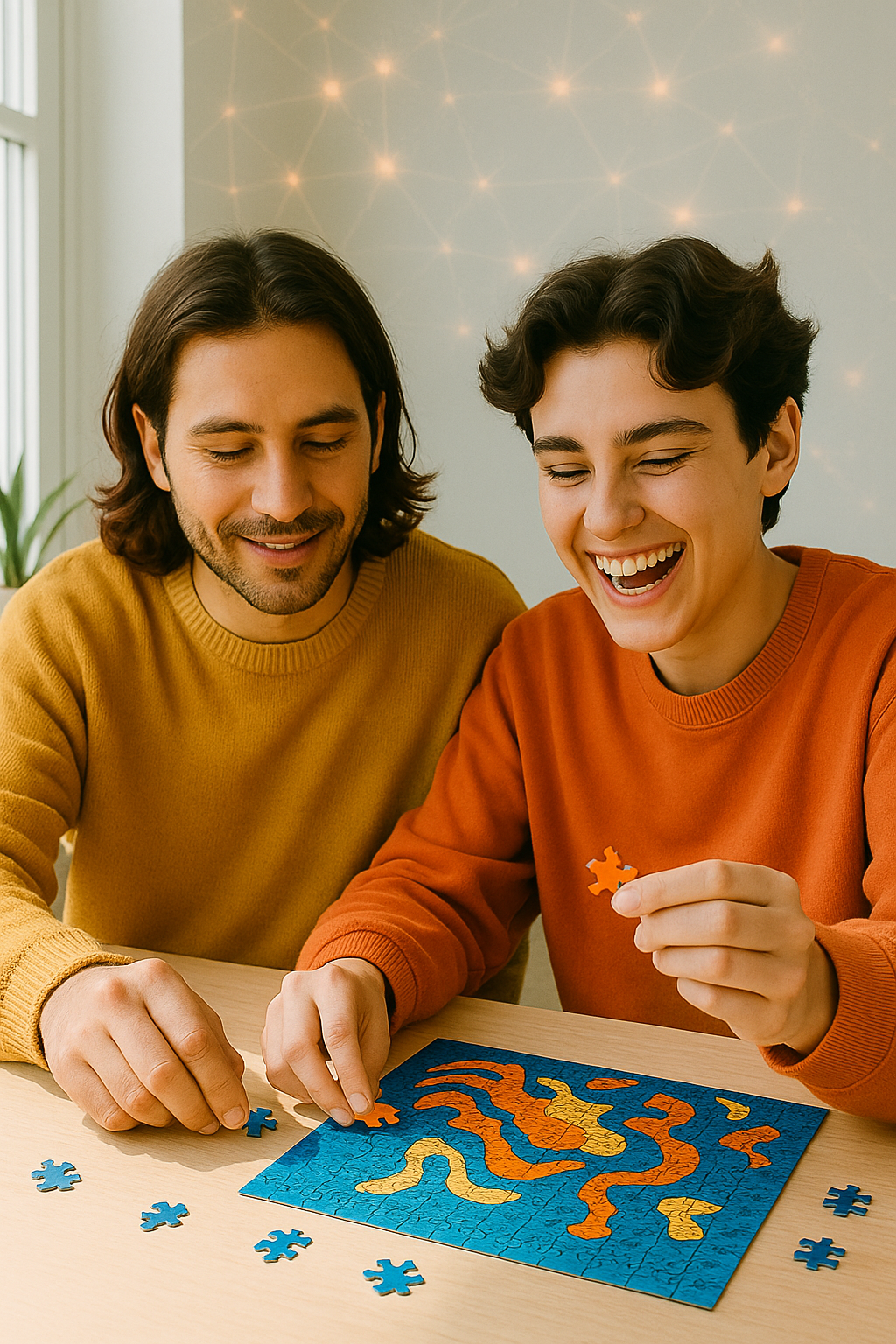PUZZLE SOLVED: Why This Ancient Hobby Is the Ultimate Brain Hack
Ever scrolled past those oddly satisfying videos of people completing the final pieces of impossibly difficult puzzles? Or watched friends post their weekend puzzle sessions complete with snacks, drinks, and that undeniable look of triumph when they snap in the final piece? Yeah, puzzle solving isn’t just your grandma’s pastime anymore—it’s having a major moment.

The New Puzzle Revolution
Let’s be real: life comes at you fast. Between doomscrolling, job hunting, and managing endless responsibilities, our brains are constantly in overdrive. That’s where puzzles slide in like that perfect piece you’ve been searching for.
I’ve always been drawn to jigsaw puzzles, even as a kid. There was something magical about watching an image emerge from chaos. But it wasn’t until recently that I rediscovered just how powerful this simple hobby can be. After long days of screen time and endless digital notifications, I found myself craving something tangible—something that would engage my mind without the artificial glow of technology.
Puzzle solving became my escape. When I’m working on a puzzle, my racing thoughts slow down, my breathing steadies, and I enter an almost meditative state. But perhaps the most unexpected benefit has been the connection it’s fostered with my father-in-law. We started working on puzzles together during family visits, and it’s become our thing—just good conversation and shared accomplishment over a growing picture.

Why Jigsaw Puzzles Are the Perfect Beginner Hobby
• Zero skill required to start – literally anyone can begin puzzling right now
• Scales perfectly with your ability – from 100-piece jigsaws to 5000-piece challenges
• Budget-friendly entry point – quality puzzles start around $15-20
• Social or solo – perfect for both “me time” and hangouts with family or friends
• No dedicated space needed – do it at your kitchen table or on a portable mat
• Instant gratification – the dopamine hit when pieces connect is scientifically proven
• Zero pressure – unlike other hobbies, there’s no failing, just problem-solving
Top 5 Puzzling "Hacks" From Pros
- Sort strategically – Begin by sorting pieces by color, pattern, or texture before assembly; this reduces overwhelm and creates manageable mini-goals
- Edge first, always – Build your frame before filling in the middle (this applies to both puzzles and most problem-solving in life!)
- Work in sections – Focus on completing distinct areas rather than random connections; your brain processes patterns more efficiently this way
- Lighting matters – Position yourself with natural light or good overhead lighting to reduce eye strain and better distinguish subtle color differences
- Take breaks – When stuck, walk away for a few minutes; your subconscious will keep working, and solutions often appear when you return with fresh eyes
Gear Up: What You Need to Start
The beauty of puzzle solving is you need almost nothing to begin. Here’s the ultra-basic starter kit:
Essential:
- A puzzle (duh) – Ravensburger puzzles are high quality once complete they are even frameable once complete ($15-25)
- A flat surface
- Optional but game-changing:
Nice to have:
- a puzzle mat ($30) to roll up unfinished puzzles
- Sorting trays ($10-15) for organizing pieces
- Good lighting that doesn’t create glare
Budget Starter Bundle: A 500-piece puzzle (~$15) + a cardboard box lid for sorting = endless entertainment for under $20.
Easy Ways to Dip Your Toes In

The Weekend Jigsaw: Choose a 500-piece puzzle with artwork that genuinely appeals to you. Set aside a few hours on a weekend afternoon, prepare your favorite beverage, and put on a relaxing playlist or podcast. Begin by sorting edge pieces and building your frame, then group similar colors or patterns. The perfect Sunday activity to unwind.
Puzzle Night: This has become a favorite tradition among my friends. We rotate hosting duties, with each person providing a new puzzle and simple snacks. We order takeout, pour some drinks, and spend the evening chatting while collaboratively working on the puzzle. It’s the perfect low-pressure social gathering—conversation flows naturally when your hands are busy.
The Unexpected Benefits of Getting Puzzled
Beyond just being fun, regular puzzling actually rewires your brain in beneficial ways:
I’ve noticed my problem-solving skills have improved dramatically since getting back into puzzles. The methodical approach required transfers naturally to workplace challenges and everyday problems. Rather than feeling overwhelmed by complicated situations, I find myself breaking them down into manageable sections—just like approaching a 1000-piece puzzle.
Perhaps most valuable in our high-stress world is puzzling’s impact on mental well-being. The focused, meditative state induced by puzzling significantly reduces stress levels. The activity requires just enough concentration to prevent anxious thoughts from intruding, creating a form of active meditation that calms the nervous system. After an hour of puzzling, I consistently feel more centered and relaxed.
Many puzzlers also report improved patience and attention to detail in all areas of life. The hobby teaches you to persist through challenges, accept temporary setbacks, and find satisfaction in gradual progress rather than instant results—a valuable counterbalance to our instant-gratification culture.
From Hobby to Hustle: The Puzzle Economy
While most people puzzle purely for pleasure, there are simple ways to turn this hobby into a modest side activity if you’re interested:
Content Creation:
- Start a puzzle-focused Instagram or TikTok showcasing time-lapses and finished pieces
- Review puzzles on YouTube or a blog (companies will eventually send you free puzzles)
Marketplace Opportunities:
- Sell completed puzzles as framed wall art on Etsy (yes, people buy these!)
- Start a puzzle exchange in your community through Meetup
Reality check: You won’t get rich, but you might fund your puzzle addiction and connect with fellow enthusiasts.
Leveling Up Your Puzzle Game
As your skills develop, your jigsaw journey might look something like:
Level 1: 500-piece jigsaws with distinct colors and patterns
Level 2: 1000+ piece challenges with more subtle details
Level 3: Specialty puzzles like gradients, double-sided, or those without box images
Level 4: 3000+ piece epic puzzles that might take weeks to complete
From there, you can expand into other puzzle types:
- 3D puzzles that create physical objects
- Wooden puzzles with uniquely shaped pieces
- Mystery puzzles where the final image differs from the box
- Escape room kits for narrative puzzle adventures
- Logic puzzles like Sudoku and crosswords for on-the-go challenges
The beauty is you can stop at any level and still enjoy the full benefits. There’s no pressure to keep climbing unless you want to.
Piece It Together
Here’s the thing about puzzles: they’re secretly a metaphor for life. Sometimes you have to try different approaches. Sometimes you need to step back to see the bigger picture. And sometimes that piece you’ve been searching for was right in front of you the whole time.
So grab a puzzle, clear some space on your coffee table, put on your favorite playlist, and give your brain the workout it’s been craving. Your future self—calmer, sharper, and smugly satisfied after completing something challenging—will thank you.
Because in a world of endless distractions, finding those moments where everything just… fits? That’s the real puzzle solution we’re all searching for.
Join the TrySomethingClub Hobby Community!
Ready to add puzzling to your hobby repertoire? The TrySomethingClub is your gateway to exploring puzzles and countless other engaging hobbies! Share your puzzle progress (whether triumphant completions or hilarious fails) on social media with #TrySomethingClub and #PuzzleSolvedChallenge to connect with other newcomers trying their hand at this brain-boosting activity.
Visit TrySomethingClub.com to discover our guides on dozens of accessible hobbies beyond puzzles—from plant propagation to watercolor painting. Drop a comment below about your first puzzle experience or which puzzle type you’re most excited to try!
Remember, the joy of hobbies is in the exploration and learning process. Whether puzzles become your new obsession or just a pleasant weekend diversion, TrySomethingClub is here to inspire your next creative adventure. Because sometimes the best way to solve life’s puzzles is to try something new!


